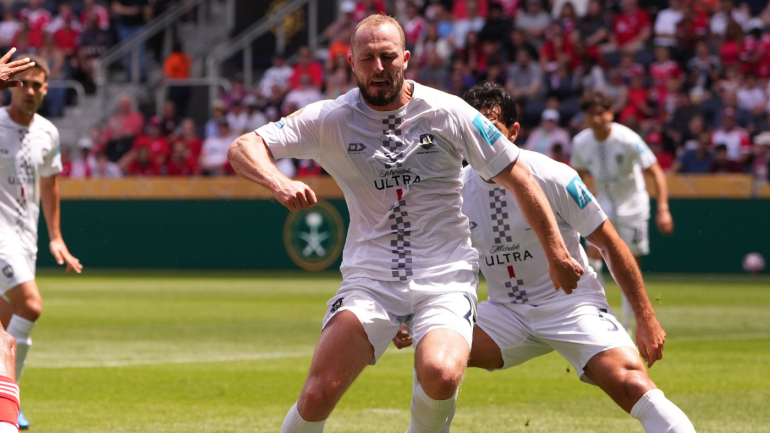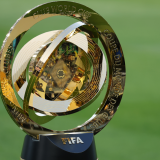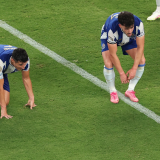Semi-pro side Auckland City belong at Club World Cup despite 10-goal drubbing at the hands of Bayern Munich
There are many things to worry about when it comes to the Club World Cup, but Auckland City shouldn't be one of them

There are an awful lot of problems with the Club World Cup. The competitive imbalance between a European giant and the best team in Oceania is not remotely near to being one of them.
Would it have been better for Gianni Infantino's summer jamboree if Bayern Munich had not run 10 past Auckland City in Cincinatti on Sunday? Of course. Given that Vincent Kompany's side slowed the scoring rate before troubling their own record winning margin -- 16-1 win against DJK Waldberg in the 1997-98 DFB Cup -- this is not a game that will make its way to the history books of either club. Auckland City have been here before and, given their dominance of the OFC Champions League, they will likely be here again.
For some that is a cause of contention. "I don't want to belittle anyone, but Bayern's opponent is semi [pro]," grumbled Boca Juniors manager Miguel Angel Russo, who really is setting himself up for the most embarrassing of falls when his side face Auckland City in the final round of Group C fixtures. In the immediate aftermath of the double digit defeat, the question was asked by many. Should Auckland City even be here?
The answer is of course. So long as we accept at first principle that a competition to establish the best club side in the world is a worthwhile endeavour then Auckland City have just as much right to be in the United States as anyone. Frankly they have more than Bayern Munich, who have not won their Champions League in the last four years.
There is no more logical way to build a tournament like this one than to draw together the best of every continent. On an annual cycle it makes sense to trim representatives from the less wealthy of the six federations before the big boys enter; in its current format there is no reason why every team should not start from the same point. Indeed a fairer question is why Oceania only gets one representative, had another team from Fiji, Tonga or elsewhere in the federation won their Champions League in recent years it would be a matter of brazen unfairness that they would have to battle it out with Auckland City while Bayern got to swan in by dint of being one of the best teams at nearly winning the European Cup.
From the big picture global view, the deck is already weighted against the New Zealanders much as it is Esperance de Tunis, off the pitch. Any suggestion that they should have to jump through further hoops just to meet the likes of Bayern Munich defies the stated purpose of this competition, loosely followed though it may be.
It is not Auckland City's fault that the professional team in town opted to play in the Australian A League, rendering themselves ineligible for the OFC Champions League. Nor are they responsible for the power balances both within football and without that mean the champions of Oceania can get by on an annual budget of about $670,000, barely enough to cover a month's salary for one of Bayern's superstars.
They have not come to the competition asking for pity nor have they gotten any. Asked directly if he felt sorry for his Auckland City counterparts, Michael Olise simply said: "No." Nor should he. If nothing else, this is hardly an out of the ordinary experience for Bayern. Four years ago they ran 12 past Bremer SV in the first round of the German Cup. On Sunday they put up 4.28 expected goals (xG) to their opponent 0.03. That is a cavernous difference but still on six occasions in the last four years of Bundesliga football Bayern have had a higher xG difference. And yet no one could reasonably argue that Bochum should play their season in a different format to Bayern just because they got tanked when they ran into them.
In the aftermath of Auckland's defeat it was widely noted that it had taken 52 years for a nation to score 10 goals at the men's World Cup proper and barely 52 hours for it to happen at Gianni Infantino's Club World Cup. That speaks to little more than the randomness of high scoring games. Using a basic match expected goals simulator speaks to the brutal imbalance between these two teams on the day. Based on the shots and xG value for both teams, this was a game Bayern Munich win 99.6 percent of the time. Even so, the odds that they run in 10 goals from the 31 shots they took? They're long. They have only a 0.2% probability of happening, at least absent other information.
This was a game of incredible scoring fortune for Bayern. Maybe the defenses Michael Olise meets across the remainder of the Club World Cup won't make it as easy for him to glide off the right flank as he did just before half time but plenty of goalkeepers who are not taking unpaid leave to be at the tournament wouldn't have been able to stop his brilliant strike for Bayern's sixth goal.
The issues around the Club World Cup are to do with the load it is placing on players, the cynical addition of clubs, the seeming disinterest of the wider footballing public. It won't help competitive balance. Those problems should not include whether a continental champion should be given access to the intercontinental championship because of one freak result against them, even if the odds of them winning a match themselves remain long.
How to watch Auckland City
- Fixtures: Friday, June 20, Benfica vs. Auckland City, 12 p.m., Inter&Co Stadium, Orlando; Tuesday, June 24, Auckland City vs. Boca Juniors, 3 p.m., GEODIS Park, Nashville
- Live stream: Watch on DAZN (for free)
- Group C winner odds: Bayern Munich -400, Benfica +500, Boca Juniors +700, Auckland City +50000
![[object Object] Logo](https://sportshub.cbsistatic.com/i/2020/04/22/e9ceb731-8b3f-4c60-98fe-090ab66a2997/screen-shot-2020-04-22-at-11-04-56-am.png)


















